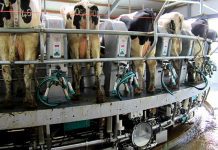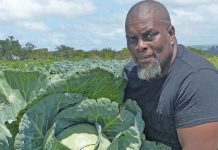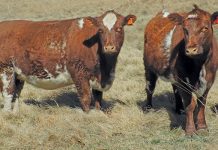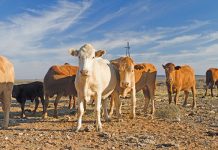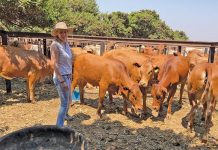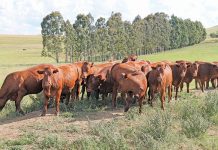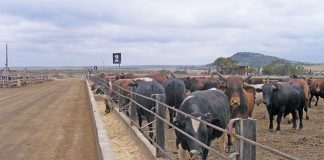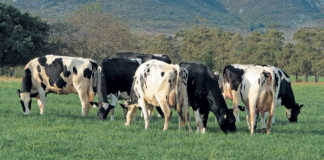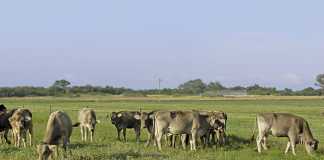When he decided it was time to start giving back to the local community, he and Piet Blom started the Agri Dwala BEE farming project. Wise decisions, hard work and commitment by Kosie, Piet and the 29 beneficiaries have helped turn the project into a flourishing business in less than five years. Denene Erasmus reports.Before the Agri Dwala project even got off the ground, Kosie van Zyl says he was determined it would be a success. “I made a long-term commitment and when the going gets tough I remind myself to focus on our vision for this project, because it’s bigger than all of us,” he explains. His hard work and perseverance have paid off, and the BEE project has made great advances in Napier, Western Cape, in just four years.
Kosie made a promise to himself to help others as he himself was helped. “My family has been living on Fairfield farm close to Napier as farm managers since 1927,” he explains. “Then, in 1995, an elderly couple approached me with an offer to take over their farm Hansieskloof. They didn’t have any children and wanted to retire. In the first year I didn’t have to pay them a cent, and after that I used farm profits to gradually buy the farm from them. “They gave me the opportunity to own my own land and start farming for myself, and I believe in giving back.”
Building from scratch
Agri Dwala started in 2006 when the Cape Agulhas Municipality made 645ha of commonage available for rent to new farmers. Kosie and Piet Blom, who also comes from the area and does consultancy work for local farmers, approached a number of small-scale farmers who were raising one or two head of cattle, and gave them the opportunity to become part of the project.“I wanted to empower people in our community and Agri Dwala is just the way,” says Piet. “It offers those who want to farm the opportunity to be trained as commercial farmers.” Kosie and Piet got together nine farmworker households from Kosie’s farm and six other households, and planted wheat on the commonage with financing from Overberg Agri, using the profits to buy cattle. Currently, Agri Dwala consists of 29 beneficiaries who own a 70% share in the business, while Kosie and Piet own a 15% share each. Agri Dwala only employs four of the beneficiaries. The rest were encouraged to keep the jobs they had. “If we had to pay everyone a full-time salary the overheads would have been too high,” says Kosie. But members of the trust receive a small dividend at each year-end.
Agri Dwala Properties was set up so that the beneficiaries could become owners of as much land as possible as soon as possible, and owns all new land bought by the trust. The beneficiaries have also agreed to re-invest most of the profits for now, so after starting with 25 head of cattle and 643ha rented land, they now farm on 1 453ha and have 518 cattle and 300 sheep. In May 2009 Agri Dwala received a R5,1 million Land Redistribution for Agricultural Development (LRAD) grant. Each beneficiary contributed R170 000 and they bought the 264ha farm Jafters Krantz, plus more sheep and a truck.
The local branch of Pioneer Foods helped them buy another farm, Karsrivier (316 ha), and they now rent two properties, the Napier commonage (643ha) and Sonop (230ha). Agri Dwala is managed by Kosie, Piet and three of the beneficiaries, John Davids, Marius Engel and Magreth Gabriels. Kosie and Marius manage the crops, while John manages the livestock.
Getting down to farming
“Kosie, Piet and I think alike,” says John. “We want this farm to be a successful land reform project and we want to farm commercially.” John’s passion is livestock farming. “We have a mixed herd of beef cattle and we plan to keep it that way. But we’re trying to breed a single-colour herd with Red Limousin and Red Angus bulls.” The cows calve in early winter or early summer and most calves are marketed at six months if born in winter, and at nine if born in summer.The 300 Dohne Merinos graze on lucerne and oats.
“We have a nine-month lambing system and all the lambs are sold at six months,” says John. “We don’t have enough land to grow the herd, so we sell all the lambs. When we need to replace ewes we buy in pregnant ones.” Kosie and Marius manage their crops on a 10-year rotation. Five years of lucerne are followed by five years of grains – one year of oats for grazing between two two-year periods of cash crops. This year they sowed 658ha – 50% wheat, 30% barley, 15% oats and 5% canola. They use sustainable farming practices such as minimum tillage, and after harvesting they leave straw on the ground to feed microorganisms, preserve soil moisture and improve soil structure.
When the road gets rocky
“There have been times I just wanted to walk away, but Piet will tell me, if I go, he goes, because we’re in this together,” says John.Kosie and Piet have also felt like walking away at times. “This is why I think it’s important for farmers who want to help new farmers to not just act as mentors, but to hold shares in the business,” says Kosie. Piet adds, “Everyone involved in the project should be equally committed, have a shared interest and responsibility and work towards the same goal – to be successful and eventually turn a profit.”The beneficiaries have also decided to give something back to the community. “We’ve started a new fruit farm project and will plant 23ha to pomegranates, figs and grapes,” says Kosie. The beneficiaries will then nominate five people from their community to benefit from – and become involved in – the project.
Contact Kosie van Zyl on 082 873 3281, or e-mail [email protected]. |fw

